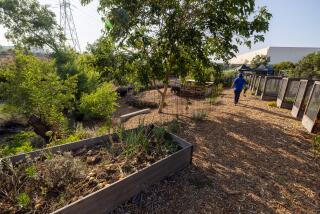Teach climate change
- Share via
Is the science of global warming too controversial to be included in California’s science textbooks?
A state Senate bill, which passed the chamber in January, would mandate that climate change be a science topic taught in the state’s public schools. But the legislation, now in the Assembly, has drawn fire from some lawmakers, who say the science is too controversial for inclusion in the curriculum. They want guarantees that the views of skeptics will be included.
But those objections are just silly. The reality is that there is no disagreement any longer among scientists on the major principles, causes and effects of global warming. The world’s largest and most reputable scientific societies, such as the American Assn. for the Advancement of Science, all concur that the burning of fossil fuels is putting so much carbon dioxide into the atmosphere that the Earth has been pushed off its natural cycle and is warming. As a result, sea levels will rise as ice sheets melt. Low-lying coastal regions will flood. And droughts and storms may become more frequent and severe.
That’s what the science tells us, and teaching students about it is perfectly appropriate. Climate change will directly affect how young people live. They are inundated with information about it, and it is already guiding some of their career choices. But they need a message of hope. Too often the media and scientific community offer only predictions of doom and gloom. Accurate or not, young people need to feel empowered. And the best way to do that is to let them explore climate change in the classroom.
There are plenty of legitimate and fascinating subjects for students to debate. Among the most important questions: Will the ice caps melt away slowly or will they disintegrate in catastrophic events? Figuring this out will tell us whether sea levels will rise a few inches or many feet in the next 100 years.
Here’s another question for students to think about: How much methane will be released by the melting of Arctic permafrost? Methane is a potent greenhouse gas, and larger concentrations of it in the atmosphere would cause a major jump in temperatures. But do higher temperatures result in more clouds? Clouds could slow warming by reflecting more sunlight back into space, though we need to better understand how clouds form before we can incorporate them into predictive models of the Earth’s temperature.
Given all of this uncertainty, the subject will certainly continue to be controversial; answers to these questions may have political and policy implications that students will have to grapple with.
There are many reasons to teach science, not the least of which is that it is inherently interesting and fun. Who doesn’t marvel at the structure and behavior of a cell upon seeing it for the first time through a microscope?
Science is also important because it is among the best ways to train students to think critically and orderly. Only in science is it polite to say, “Prove it to me!” And good science repeatedly does, through testing and retesting of evidence, assumptions and methods. This approach provides us a common language to interpret the world.
But learning science is difficult. So science education tends to focus on phenomena that we know a great deal about and can explain most easily, such as the laws of motion as applied to a pendulum.
The problem is that a curriculum built solely on these tried-and-true examples is boring. Students know their work only replicates something already known. They don’t see ways that they might one day explore and advance the field.
Controversial science, on the other hand, inspires. It poses grand questions, debates new theories and offers answers that can take on political overtones because of their implications for society. There is already a lot of it in the curriculum. The most obvious example is evolution, the controversy about which can be summed up with an understatement: Although the science is not in question, the theory is at odds with some religious beliefs.
Interestingly, less politically charged topics are often more scientifically controversial and are associated with far more uncertainty.
Take the Big Bang. While we generally accept it as the origin of the universe, and scientists have compiled tremendous and compelling evidence for what it was like, we have no idea what caused it. Even less grandiose topics like plate tectonics are controversial. Anyone looking at a globe can see that the continents fit together, and we have satellite measurements that prove they are moving. But we still don’t know what drives them. Should we take the science out of schools?
Climate-change science is no different from these topics and other emerging areas of science already in the curriculum, such as dark matter and genetic engineering. And according to the National Science Teachers Assn., climate-change science meets every national education standard while lending itself to compelling teaching.
So let’s get climate change and other controversial science into the curriculum. We do a disservice to students and educators to do otherwise.






